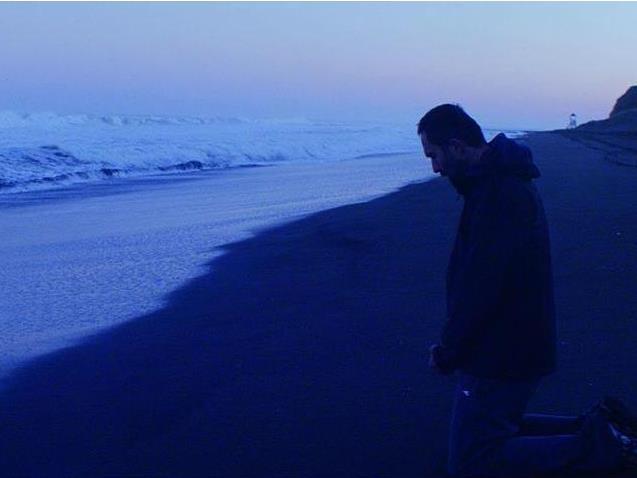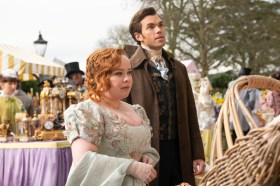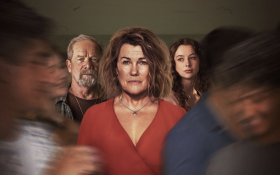Image: miff.com.au
In the small town of La Boca by the Chilean seaside, four men eke out a modest existence. Set routines form a distinctive rhythm in their shared house, their communal pastime — training and racing their pet greyhound — the only outlier brightening up the cycle of eating, drinking, abiding by various rules and watching television. And yet, Fathers Vidal (Alfredo Castro, Aurora), Ortega (Alejandro Goic, Gloria), Silva (Jaime Vadell, Santiago Violenta) and Ramirez (Alejandro Sieveking, The Dance of Reality) submit to days defined by a languid ebb and flow, under the watch of Sister Monica (Antonia Zegers, La memoria del agua). Their plodding life feels like a form of purgatory, as it is intended to, with all five marooned in the Catholic Church’s earthly version of limbo for their various trespasses and transgressions.
Writer/director Pablo Larraín initially establishes their reality with an atmospheric array images set to Carlos Cabezas’s (Paseo de Oficina) string-heavy score, in The Club‘s (El Club) first attempt to attune audiences to their tempo. He offers slivers of the extraordinary in a situation that can only be described as such for the wrong reasons, as vision of the beach, sunsets and a seeming sense of camaraderie litter the film’s early frames. Whatever comfort they might bring is as fleeting for the viewer as it is for the feature’s characters, given that Larraín shows the snatches of solace present in their status quo only so that he can then threaten to tear it to pieces. The parallels are clear; after 2008’s Tony Manero, 2010’s Post Mortem and 2012’s No, he once more turns his filmmaking gaze towards the corrupt state of his nation by laying bare the thrall religion holds over the faithful, and the many ways that trust can be perverted.
So it is that a violent incursion shakes his not-so-merry band of clergy out of their dutifully accepted lull, and portends to expose their secrets. A new resident, Father Lazcano (Jose Soza, La Jubilada), enters the abode to similarly bide his time with the other inhabitants; however his arrival catches the attention of a local fisherman (Roberto Farías, El Cordero). Soon, the latter is yelling his detailed grievances about the former in the street; just as swiftly, crisis counsellor Father Garcia (Marcelo Alonso, Caleuche: The Call of the Sea) is despatched to deal with the aftermath. As Vidal and his company of parish-less priests are probed about their past and present sins, they see his visit as the first step to shutting down their house.
Working with co-writers Guillermo Calderón (Violeta Went to Heaven) and Daniel Villalobos, Larraín both understands and revels in the inflammatory nature of his scenario and the accompanying statement he’s overtly making. Rare is the image or exchange that isn’t loaded with commentary, nor chills with equal parts dark satire and devastating horror, resulting in a simultaneously powerful yet delicate display of questioning. Whether prolonging a soul-crushing tale screamed from a sidewalk, interrogating multifaceted yet fragile figures direct to camera, or employing the movie’s many canines to demonstrate the extent of church cover-ups at their most extreme, the meticulous psychological dissection The Club accomplishes can’t be underestimated, nor can its impact. If its opening finds beauty in the mundane, everything that follows heightens the sinister within the standard.
Such capably handled and competently navigated material — as tellingly bathed in shadows and shot with almost too-close intimacy by cinematographer Sergio Armstrong (Nasty Baby), as well as tensely stitched together with edge-of-your-seat suspense by editor Sebastián Sepúlveda (Young and Wild) — requires a stellar cast capable of conveying subtlety, complexity and duality. Accordingly, Larraín largely mines talent from his previous efforts to fill the feature’s key roles, and both are rewarded for their loyalty. Off screen, creatives at the height of their crafts converge for a harrowing ordeal; on screen, familiarity seethes through a disparate group united only by their adherence to shared beliefs. It is little wonder, then, that the unsettling feeling The Club leaves audiences with is of cloistering and claustrophobia as it causes its own scandals among the insidious and the insular.
Rating: 4.5 stars out of 5
The Club (El Club)
Director: Pablo Larraín
Chile, 2015, 98 mins
Melbourne International Film Festival
July 30 – August 16
Actors:
Director:
Format:
Country:
Release:





